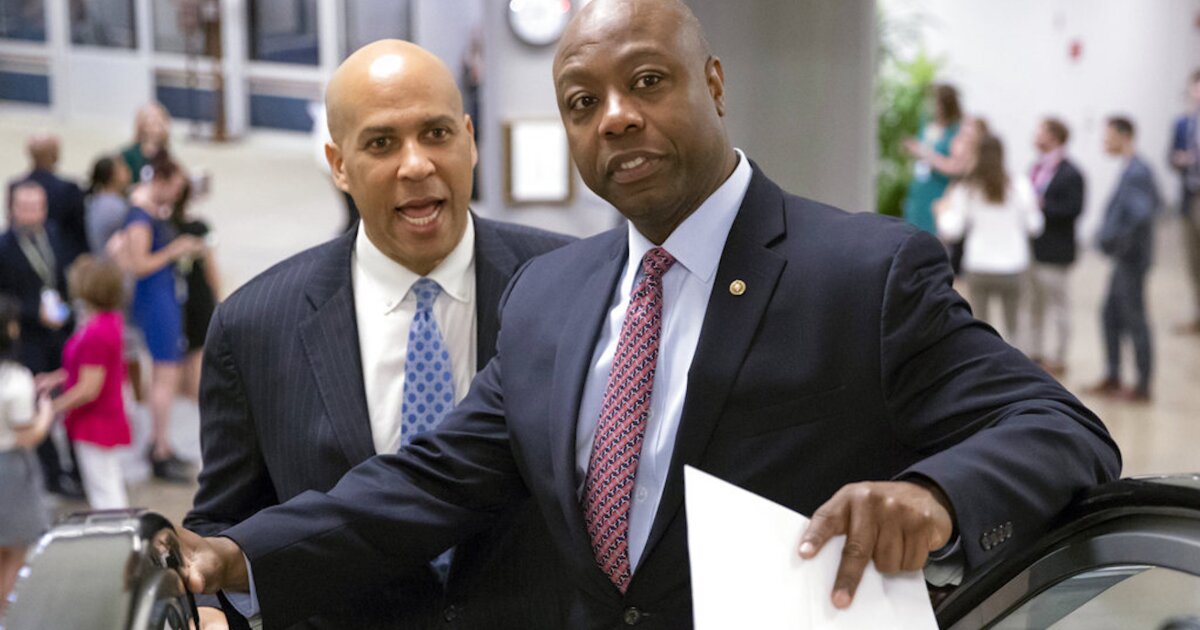

Sens. Cory Booker (D-NJ) and Tim Scott (R-SC) continue to negotiate on their long-awaited police reform package, but progress has ground to a halt.
The senators publicly maintain that they never left the negotiating table, and that is technically true. They and their offices have taken part in meetings on police and criminal justice reform matters as recently as this month, but talks haven’t been fruitful since efforts to pass a comprehensive deal fell apart in late 2021. A GOP source familiar with negotiations told the Washington Examiner that the most likely path forward involves passing individual items with bipartisan support in a piecemeal fashion.
SCHUMER PROJECTS DEBT CEILING OPTIMISM AS PROGRESSIVES FRET ABOUT DEAL
“Well, nothing is ever ‘dead,'” the source said of a larger package. “But right now, Democrats are not willing to come to the negotiating table.”
Sen. John Cornyn (R-TX), a member of Senate GOP leadership who was involved in talks, confirmed as much when asked by the Washington Examiner on Thursday about the status of a bipartisan police reform deal. He also brought up his de-escalation training package, which was signed into law by President Joe Biden in December.
“What I understand is that negotiations between [Sen.] Tim [Scott] and Sen. Booker have essentially not yielded any results,” he said.
Sen. Lindsey Graham (R-SC), who also took part in the talks, told the Washington Examiner that it would “probably be difficult right now” to get a package passed and agreed with the assertion that there was currently “not a realistic” path forward on a larger deal.
Booker disputed this when approached by the Washington Examiner in the Capitol, responding, “Absolutely, yes,” after being asked if it was reasonable to say that a police reform package could pass in the next year or so.
Scott, Booker, and then-Sen. Kamala Harris, the only three black members of the Senate at the time, began attempts to work on a compromise police reform package in the summer of 2020. The nation was reeling over the murder of George Floyd, whose death at the hands of a white police officer sparked a season of protests and nationwide calls for accountability. Those talks fell apart after Harris, then the vice presidential nominee, walked away from a deal. Scott and Booker returned to the negotiating table in April 2021 amid calls to do so as the nation watched the murder trial for Floyd’s killer.
Discussions continued until the fall when negotiators were unable to break a stalemate on several critical sticking points. The two sides could not reach a compromise on the issue of qualified immunity, the doctrine that shields law enforcement officers from personal liability. Nor could they agree on codifying an executive order signed by former President Donald Trump that established new guidelines for use of force and de-escalation tactics and set up a federal database tracking police misconduct. Several other provisions included in House Democrats’ George Floyd Justice in Policing Act also emerged as points of contention in the Senate talks.
Both senators engaged in typical Beltway finger-pointing when asked to explain how and why this multiyear effort had fallen apart, with neither admitting to being the ones who walked away. Scott claimed in a CBS interview that Booker’s move to codify the order was akin to “defunding the police,” as it would make federal funding for law enforcement conditional. He also argued it would “nationalize local policing.”
Booker described the dispute as his final straw, telling Mother Jones at the time, “I finally said ‘enough’ when they wouldn’t even endorse the Donald Trump executive order. When that fell to the wayside, I was like, ‘You gotta be kidding me. … This is not making progress.'” He also noted to CNN that same day, “We couldn’t even get agreement to memorialize what is already the law of the land via executive order.”
Booker and Scott, who have both served in the Senate since 2013, are also friends. They have declined to criticize one another personally despite their inability to reach a deal. They’ve also remained in touch on the police reform issue in hopes of reviving the effort down the line.
Talks were revived in January of this year after the police beating death of Tyre Nichols, an unarmed black man driving to his mother’s home in Memphis, Tennessee.
The effort quickly fizzled.
After Senate Majority Whip Dick Durbin (D-IL) publicly called on Booker and Scott to return to the negotiating table, the GOP senator responded by calling out his senior Democratic colleague on the Senate floor for filibustering his police reform legislation two years prior.
Scott used the speech to call for “simple legislation” to address “common sense” reforms, including increased federal funds for de-escalation training in police departments and additional resources for officers on the scene who have a “duty to intervene” in dangerous interactions with civilians.
While not particularly moved by Durbin, Scott likely felt some pressure after Biden invited Nichols’s mother to the State of the Union, where she pleaded with lawmakers to “do something” as they gave her a standing ovation. The president also used the address to call on Congress to “do something” on police reform. Still, it would not be enough to revive bipartisan talks in a constructive way, especially given the shift in the political environment.
Republicans retook the House of Representatives, albeit by a small margin, in the 2022 midterm elections, just months before Biden’s address. The new GOP majority has shown little interest in moving such a package forward, even if Booker and Scott could find a way to a deal. House Judiciary Committee Chairman Jim Jordan (R-OH), whose panel would likely have jurisdiction over passing such legislation through the lower chamber, said in response to Nichols’s death, “You tell me what law is going to change that terrible behavior we saw.”
CLICK HERE TO READ MORE FROM THE WASHINGTON EXAMINER
House Speaker Kevin McCarthy (R-CA), meanwhile, has largely deferred to Jordan on the issue.
Asked about that opposition and the litany of other unresolved policy disputes in a February appearance on NBC’s Meet the Press, Booker replied, “I’m sobered about the belief that we can get a big comprehensive bill done. But can we get something done? I believe we can.”





